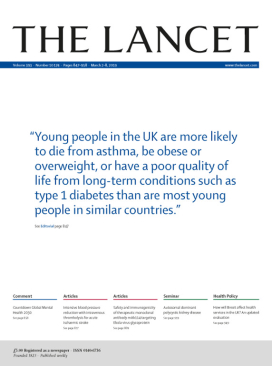Related Research Articles

The Lancet is a weekly peer-reviewed general medical journal and one of the oldest of its kind. It is also the world's highest-impact academic journal. It was founded in England in 1823.

Alan Julian Macbeth Tudor-Hart, commonly known as Julian Tudor Hart, was a general practitioner (GP) who worked in Wales for 30 years, known for theorising the inverse care law. He produced medical research and wrote many books and medical articles.

Kamran Abbasi is the editor-in-chief of the British Medical Journal (BMJ), a physician, visiting professor at the Department of Primary Care and Public Health, Imperial College, London, editor of the Journal of the Royal Society of Medicine(JRSM), journalist, cricket writer and broadcaster, who contributed to the expansion of international editions of the BMJ and has argued that medicine cannot exist in a political void.

Diogenes syndrome, also known as senile squalor syndrome, is a disorder characterized by extreme self-neglect, domestic squalor, social withdrawal, apathy, compulsive hoarding of garbage or animals, and a lack of shame. Affected people may also display symptoms of catatonia.

Anatoly Ivanovich Koryagin is a psychiatrist and Soviet dissident. He holds a Candidate of Science degree. Along with others, he exposed political abuse of psychiatry in the Soviet Union. He pointed out Russia constructed psychiatric prisons to punish dissidents.
The Goulstonian Lectures are an annual lecture series given on behalf of the Royal College of Physicians in London. They began in 1639. The lectures are named for Theodore Goulston, who founded them with a bequest. By his will, dated 26 April 1632, he left £200 to the College of Physicians of London to found a lectureship, to be held in each year by one of the four youngest doctors of the college. These lectures were annually delivered from 1639, and have continued for more than three centuries. Up to the end of the 19th century, the spelling Gulstonian was often used. In many cases the lectures have been published.

The Lumleian Lectures are a series of annual lectures started in 1582 by the Royal College of Physicians and currently run by the Lumleian Trust. The name commemorates John Lumley, 1st Baron Lumley, who with Richard Caldwell of the College endowed the lectures, initially confined to surgery, but now on general medicine. William Harvey did not announce his work on the circulation of the blood in the Lumleian Lecture for 1616 although he had some partial notes on the heart and blood which led to the discovery of the circulation ten years later. By that time ambitious plans for a full anatomy course based on weekly lectures had been scaled back to a lecture three times a year.

Sir Andrew Paul Haines, FMedSci is a British epidemiologist and academic. He was the Director of the London School of Hygiene & Tropical Medicine from 2001 to 2010.
The Bradshaw Lectures are lectureships given at the invitation of the Royal College of Physicians and the Royal College of Surgeons of England. It is held on alternate years in rotation with the Hunterian Oration.
The Hunterian Oration is a lecture of the Royal College of Surgeons of England, named in honour of pioneering surgeon John Hunter and held on his birthday, 14 February, each year.
Himmatrao Saluba Bawaskar is an Indian physician from Mahad, Maharashtra. He is known for his research on treatment for scorpion stings. Much of his work has been published in the British medical journal The Lancet. He has also conducted research in the fields of snake bites, cardiovascular diseases, and hypothyroidism.
Dinesh Kumar Makhan Lal Bhugra is a professor of mental health and diversity at the Institute of Psychiatry at King's College London. He is an honorary consultant psychiatrist at the South London and Maudsley NHS Foundation Trust and is former president of the Royal College of Psychiatrists. He has been president of the World Psychiatric Association and the President Elect of the British Medical Association.

Khalida Ismail is Professor of Psychiatry and Medicine at the Institute of Psychiatry, King's College London, specializing in diabetes and mental health. Ismail is an Honorary Consultant Liaison Psychiatrist at King's College Hospital NHS Foundation Trust.
John Gordon Williams is a British health services researcher and clinical academic gastroenterologist. He led the establishment of the Postgraduate Medical School in Swansea, created and developed the Health Informatics Unit at the Royal College of Physicians, and was the founding president of WAGE, the Welsh Association for Gastroenterology and Endoscopy Williams was appointed a CBE for services to medicine in 2014.

Otto Herbert Wolff, was a German born medical scientist, paediatrician and was the Nuffield Professor of Child Health at Great Ormond Street Hospital. Wolff was notable for being one of the first paediatricians in Britain to set up a clinic for obese children. Later research into plasma lipids with Harold Salt pioneered the techniques of lipoprotein electrophoresis. He later conducted research into the role of lipid disturbance in childhood as a precursor of coronary artery disease and his recognition in 1960 of the rare condition of abetalipoproteinaemia. Wolff was also co-discoverer of the Edwards syndrome in abnormal chromosomes.

Jocalyn Clark is a Canadian Public Health Scientist and the International Editor of The BMJ, with responsibility for strategy and internationalising the journal's content, contributors and coverage. From 2016 to 2022, Jocalyn was an Executive Editor at The Lancet, where she led the Commentary section, coordinated peer review, and edited and delivered collections of articles and Commissions on topics such as maternal and child health, oral health, migration, end of life care and gender equity. She led the Lancet's project to advance women in science, medicine, and global health, #LancetWomen. She is also an Adjunct Professor of Medicine at the University of Toronto and an Honorary Associate Professor at the Institute for Global Health at UCL.

The International Medical Congress was a series of international scientific conferences on medicine that took place, periodically, from 1867 until 1913.
The Huxley Lecture was a memorial lecture instituted by Charing Cross Hospital Medical School in 1896 to honour Thomas Henry Huxley and is delivered biennially. The Huxley Lecture was one of two memorial lectures created to honour Huxley. The other lecture series is known as The Huxley Memorial Medal and Lecture and was created in 1900 by the Royal Anthropological Institute of Great Britain and Ireland.
Charles Cady Ungley (14 July 1902, London – 21 August 1958, Newcastle upon Tyne) was an English physician and medical researcher, known for his research on the therapeutic uses of vitamin B12. In 1938 he was the Goulstonian Lecturer.

Thomas King Chambers was an English physician who published and lectured on diet and digestion. He was among the first to advocate medicine as a career for women. He was a founder and trustee of the London School of Medicine for Women.
References
- ↑ "Dr. Derek Summerfield, BSc(Hons), MBBS, MRCPsych." Archived 2011-08-23 at the Wayback Machine Accessed 4-24-2012.
- ↑ "Derek Summerfield: Apartheid revisited." Al-Ahram Weekly, 14 - 20 August 2008, Issue No. 910. Archived 19 January 2012 at the Wayback Machine
- ↑ "Derek Summerfield". The Lancet. 354 (9187): 1398. 16 October 1999. doi:10.1016/S0140-6736(05)76261-9. S2CID 54285238.
- ↑ Refugee Studies Centre Annual Report 2006-2007. Accessed 4-24-2012.
- ↑ Sarraj, E. E.; Punamaki, R. L.; et al. (1996). "Experiences of torture and ill-treatment and posttraumatic stress disorder symptoms among Palestinian political prisoners". Journal of Traumatic Stress. 9 (3): 595–606. doi:10.1002/jts.2490090315. PMID 8827659.
- ↑ Summerfield, D (1993). "The roots of torture and atrocity". BMJ. 306 (6874): 403. doi:10.1136/bmj.306.6874.403. PMC 1676466 .
- ↑ Summerfield, D. (1995). "Addressing human response to war and atrocity." in Beyond Trauma, New York: Plenum: 17-29.
- ↑ Summerfield, D. (1997) "The impact of war and atrocity on civilian populations." Psychological trauma: A developmental approach. D. Black, M. Newman, J. Harris-Hendricks and G. Mezey. Glasgow, Royal College of Psychiatrists: 148-155. Archived 2016-03-03 at the Wayback Machine
- ↑ Summerfield, D.; Gorst-Unsworth, C. (1991). "Asylum seekers in British prisons". The Lancet. 338 (8776): 1212. doi:10.1016/0140-6736(91)92081-c. PMID 1682623. S2CID 31468258.
- ↑ Summerfield, D (1987). "Nicaragua: War and Mental Health". The Lancet. 330 (8564): 914. doi:10.1016/s0140-6736(87)91398-5. PMID 2889105. S2CID 33497770.
- ↑ Summerfield, D (1990). "Nicaragua: Health and Revolution". The Lancet. 335 (8693): 845. doi:10.1016/0140-6736(90)90948-5. S2CID 54320502.
- ↑ Summerfield, D (1995). "Raising the dead: War, reparation, and the politics of memory". BMJ. 311 (7003): 495–497. doi:10.1136/bmj.311.7003.495. PMC 2550549 . PMID 7647648.
- ↑ Summerfield, D (1991). "Guatemala: Health, human rights, and landlessness". The Lancet. 337 (8748): 1028–1029. doi:10.1016/0140-6736(91)92676-s. S2CID 53301648.
- ↑ Summerfield, D (1997). "The Mayas of Guatemala: Surviving terror". The Lancet. 349 (9045): 130. doi:10.1016/s0140-6736(05)63260-6. PMID 8996438. S2CID 26355758.
- ↑ Summerfield, D (1999). "Bosnia and Herzegovina and Croatia: the medicalisation of the experience of war". The Lancet. 354 (9180): 771. doi: 10.1016/S0140-6736(99)90154-X . PMID 10475210. S2CID 33487958.
- ↑ Summerfield, D (2003). "War, Exile, Moral Knowledge and the Limits of Psychiatric Understanding: A Clinical Case Study of a Bosnian Refugee in London". International Journal of Social Psychiatry. 49 (4): 264–268. CiteSeerX 10.1.1.119.9730 . doi:10.1177/0020764003494004. PMID 14727693. S2CID 23718254.
- ↑ Summerfield, D. A. (1990). "Doctors and torture". The Lancet. 336 (8715): 634. doi:10.1016/0140-6736(90)93433-p. PMID 1975407. S2CID 35061398.
- ↑ Summerfield, D (1993). "The roots of torture and atrocity". BMJ. 306 (6874): 403. doi:10.1136/bmj.306.6874.403. PMC 1676466 .
- ↑ Summerfield, D (1995). "Book Review: Counselling & Therapy With Refugees: Psychological Problems of Victims of War, Torture & Repression by Guus van der Veer". BMJ. 310 (6975): 339. doi:10.1136/bmj.310.6975.339. S2CID 72288581.
- ↑ Summerfield, D (1999). "Book Review: An End to Torture: Strategies for Its Eradication by Bertil Dunér". BMJ. 318 (7194): 1358. doi:10.1136/bmj.318.7194.1358a.
- ↑ Summerfield, D (1996). "Rwanda: When women become killers". The Lancet. 347 (9018): 1816. doi:10.1016/s0140-6736(96)91625-6. S2CID 54229654.
- ↑ Summerfield, D (1998). "If children's lives are precious, which children?". The Lancet. 351 (9120): 1955. doi:10.1016/s0140-6736(98)06056-5. PMID 9654281. S2CID 27234489.
- ↑ Summerfield, D (2000). "Childhood, War, Refugeedom and 'Trauma': Three Core Questions for Mental Health Professionals" (PDF). Transcultural Psychiatry. 37 (3): 417–433. doi:10.1177/136346150003700308. S2CID 73217600.
- ↑ Summerfield, D (1998). "Trauma, post-traumatic stress disorder, and war". The Lancet. 352 (9131): 911. doi:10.1016/s0140-6736(05)60057-8. PMID 9743021. S2CID 42531638.
- ↑ Summerfield, D (2001). "The invention of post-traumatic stress disorder and the social usefulness of a psychiatric category". BMJ. 322 (7278): 95–98. doi:10.1136/bmj.322.7278.95. PMC 1119389 . PMID 11154627.
- ↑ Bracken, Patrick J.; Giller, Joan E.; Summerfield, Derek (1995). "Psychological responses to war and atrocity: the limitations of current concepts" (PDF). Social Science & Medicine. 40 (8): 1073–1082. doi:10.1016/0277-9536(94)00181-r. PMID 7597460.
- ↑ Summerfield, D (2001). "The invention of post-traumatic stress disorder and the social usefulness of a psychiatric category". BMJ. 322 (7278): 95–98. doi:10.1136/bmj.322.7278.95. PMC 1119389 . PMID 11154627.
- ↑ Summerfield, Derek (2004). "Cross-Cultural Perspectives on the Medicalization of Human Suffering". Posttraumatic Stress Disorder. pp. 233–245. doi:10.1002/9780470713570.ch12. ISBN 9780470713570.
- ↑ Summerfield, D (2011). "Income inequality and mental health problems". The British Journal of Psychiatry. 198 (3): 239. doi: 10.1192/bjp.198.3.239 . PMID 21357885.
- ↑ Summerfield, D. A. (2012). "The exaggerated claims of the mental health industry". BMJ. 344: e1791. doi:10.1136/bmj.e1791. PMID 22418416. S2CID 2311834.
- ↑ Summerfield, D (2008). "How scientifically valid is the knowledge base of global mental health?". BMJ. 336 (7651): 992–4. doi:10.1136/bmj.39513.441030.AD. PMC 2376212 . PMID 18456630.
- ↑ Summerfield, D.; Giacaman, R.; et al. (2011). "Mental health, social distress and political oppression: The case of the occupied Palestinian territory". Global Public Health. 6 (5): 547–559. doi:10.1080/17441692.2010.528443. PMID 21108104. S2CID 46010110.
- ↑ Summerfield, D (1997). "Medical ethics: The Israeli Medical Association". The Lancet. 350 (9070): 63–4. doi:10.1016/s0140-6736(05)66265-4. PMID 9217730. S2CID 54339474.
- ↑ Summerfield, D (1997). "The truth about Israeli medical ethics". The Lancet. 350 (9086): 1247. doi: 10.1016/s0140-6736(05)63477-0 . S2CID 54239866.
- ↑ Summerfield, D (2003). "Medical ethics, the Israeli Medical Association, and the state of the World Medical Association". BMJ. 327 (7423): 1108. doi:10.1136/bmj.327.7423.1107-b. PMC 261772 .
- ↑ Summerfield, D.; Green, C.; et al. (2007). "Medical ethical violations in Gaza". The Lancet. 370 (9605): 2102. doi:10.1016/s0140-6736(07)61784-x. PMID 18156030. S2CID 28379277.
- ↑ Summerfield, Derek (2004). "Palestine: the assault on health and other war crimes". British Medical Journal . 329 (7471): 924. doi:10.1136/bmj.329.7471.924. PMC 523135 . PMID 29465916.
- ↑ Fellerman, Simon M (2004). "Palestinian health: the truth, the lies, and the statistics". British Medical Journal . 329 (7474): 1110. doi:10.1136/bmj.329.7474.1110. PMC 526137 .
- ↑ Mansdorf, Irwin J (2004). "Palestine: the assault on health and other war crimes". British Medical Journal . 329 (7474): 1102. doi:10.1136/bmj.329.7474.1102-a. PMC 526161 .
- ↑ Rouse, A M (2004). "But about who's suffering worse—there's no argument". British Medical Journal . 329 (7474): 1101–1102. doi:10.1136/bmj.329.7474.1101-b. PMC 526160 .
- ↑ "Doctors demand Yoram Blachar resign as ethics chief over Israeli torture," The Guardian, Sunday 21 June 2009 .
- ↑ Authors, The International Critical Psychiatry Network Archived 2013-12-16 at the Wayback Machine Accessed May 10th, 2013